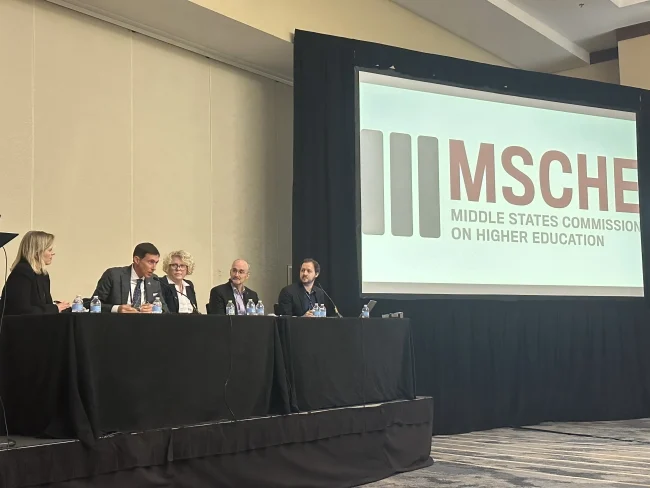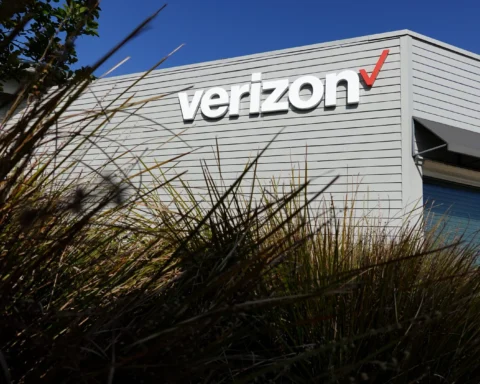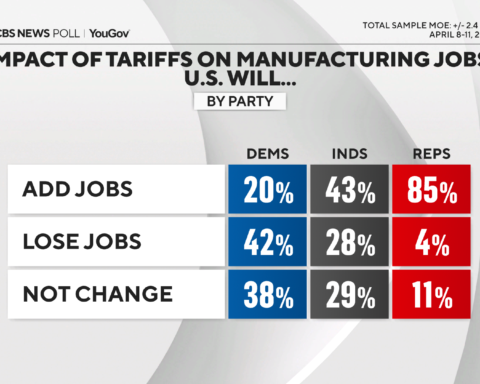By Josh Moody
The talk at the annual Middle States Commission on Higher Education conference last week centered on the changes coming to higher education as President-elect Donald Trump returns to the White House in January.
But exactly what those changes will look like remains a matter of pure speculation, given how disconnected Trump’s rhetoric often is from the realities of his policies. Before an audience of college leaders, accreditation liaisons and commission members, speakers pondered whether Republicans can enact Trump’s sweeping higher education agenda amid regular GOP infighting, competing policy priorities and looming midterm elections.
Trump’s pledge to reshape higher education has often focused on accreditation. He has threatened to fire accreditors or force them to drop diversity, equity and inclusion from their standards, and vowed to open up the marketplace for new accrediting bodies. Whether he can—and how he would go about it—remains unclear.
But it gave the participants at last week’s MSCHE conference plenty to discuss. Here’s a look at what transpired:
Previewing the Trump Agenda
At an early breakfast on Thursday, Vic Klatt, a principal at Penn Hill Group, a lobbying and consulting firm, offered a group of presidents and provosts a glimpse of the year ahead.
The people driving education policy are changing, he noted, pointing to the end of an era on the House Committee on Education and the Workforce as Chair Virginia Foxx, a North Carolina Republican, steps down. Klatt noted—before the pick was made official later that day—that Michigan Republican Tim Walberg was one of two candidates proposed to fill Foxx’s seat on the committee.
“The fact that she’s not there is a big deal,” Klatt said, adding that Walberg “hasn’t cut a big path” on education policy but “he’s very familiar with the issues” and “an interesting choice.”
Another big personnel change is Linda McMahon, whom Trump nominated to be secretary of the Department of Education, Klatt said. He pointed out that she has long-standing ties to the president-elect given her role as head of the Small Business Administration during his first term, as well as her work on his transition team.
Klatt also cited McMahon’s time as a top executive in WWE from the 1980s through 2009, noting she would bring management experience that could be useful to a department beset by management issues. Specifically, Klatt pointed to the bungled rollout of the simplified Free Application for Federal Student Aid form, which he referred to as “the FAFSA screwups,” as an example of management issues.
“The education world, in my view, could have done a lot worse,” Klatt said about McMahon.
He also focused on politics, process and policy, noting that Trump’s policy aims have been vague but bold. Some proposals—such as eliminating the Department of Education—seem unlikely, he said. Such a move would be a massive undertaking that would require the legislative support of Democrats, given the narrow Republican majorities in Congress.
Klatt argued that Trump’s threats to undo DEI might be similarly hard to carry out. While he expects “an executive order or something to that effect to come out very early” in Trump’s second term, it remains unclear how the Department of Education might act on such a demand.
“The Education Department is going to run into several complications,” including the lack of a consensus on what constitutes DEI, which will require ED to craft a clear definition, he said.
While he expects Trump’s rhetoric to align more closely with policy in his second administration than it did in his first, Klatt said one key question for him is “Can Republicans govern?” Though the GOP has control of the House, the Senate and the executive branch, Klatt said he wouldn’t be surprised to see challenges due to infighting and the possible reluctance of some incumbents to make politically risky moves with midterms around the corner.
But for all the uncertainty around the incoming administration’s impact on higher ed, Klatt said he thought it was clear that Trump would roll back a number of regulations, likely striking down the Biden administration’s Title IX regulations and student loan relief efforts.
A Candid Conversation With College Presidents
At a conference session moderated by Inside Higher Ed, three presidents fielded questions on such topics as federal policy, college financial issues and the role of accreditor oversight.
Asked about Trump’s threat to fire accreditors, Jonathan Peri, president of Manor College and a MSCHE commissioner, was skeptical that the president-elect could deliver on that promise.
“That’s going to require an act of Congress,” Peri said, noting that tight margins will make it difficult for Trump to dump accreditors or launch new accrediting bodies.
Inside Higher Ed also asked the panel of presidents about Trump’s threat of mass deportation for undocumented immigrants and what effect that might have on their students and community.
Washington & Jefferson College president Elizabeth MacLeod Walls said that while the issue largely “does not affect [our] student population as it is today,” she worries about students’ families and the surrounding communities. She said her focus is not on “anticipating any particular policy change from the Trump administration” but rather on being ready to support students.
Randy VanWagoner, president of Mohawk Valley Community College in Utica, N.Y., expressed concerns about how such threats might be perceived by the large refugee population in his area, who go through a rigorous immigration process. He worried about the “the potential for them to be lumped into undocumented migrants and immigrants” and also face threats of deportation.
Panelists also fielded a question about whether Pennsylvania—which faces grim demographics —has too many colleges and whether some should close. (Four Pennsylvania colleges announced closures this year, the most of any state, while others merged.)
“My perspective here is that the issue isn’t too many institutions; it’s what is preventing students from being able to access or achieve college?” Peri said, noting cost concerns as one factor. Peri also emphasized the need for colleges to grow auxiliary revenues to stabilize their finances.
One Pennsylvania institution that closed abruptly this year was University of the Arts, located minutes away from where the MSCHE conference took place in downtown Philadelphia. That closure was brought on by mysterious financial issues that have not been fully explained.
Asked if accreditors were doing enough to detect financial issues early, Peri suggested that “the relationships that our institutions have with our accreditors are ones of synergy and strong communication, and what we’ve seen in the press are the outliers”—troubled colleges marked by a “precipitous drop-off” in enrollment and a lack of “effective communication” from administrators. He added that MSCHE is always working to improve communication with colleges as it updates processes.
MacLeod Walls said accreditors appear to be paying more attention than ever. But she noted that sometimes accreditors can’t keep up with events; while colleges regularly provide financial data, it can be hard for accreditors to account for unexpected fiscal issues that arise suddenly and deal severe, or fatal, blows to institutions.
“Very often, financial stress that leads to closure happens very quickly. It’s cumulative, and it doesn’t take people by surprise, but one bad financial move by an institution that’s already suffering can lead very quickly to having to make really tough decisions,” MacLeod Walls said.
Ending the session on a positive note, the presidents discussed what gave them hope. MacLeod Walls and Peri both answered students, noting their creativity and the thrill of seeing them grow as people. They cited examples of character and sportsmanship from student athletes.
VanWagoner expanded that notion to the workers who keep colleges running.
“While our students provide us inspiration, it’s the adaptability of our faculty and staff that I have witnessed over the last 10 years in particular that gives me hope,” he said.





